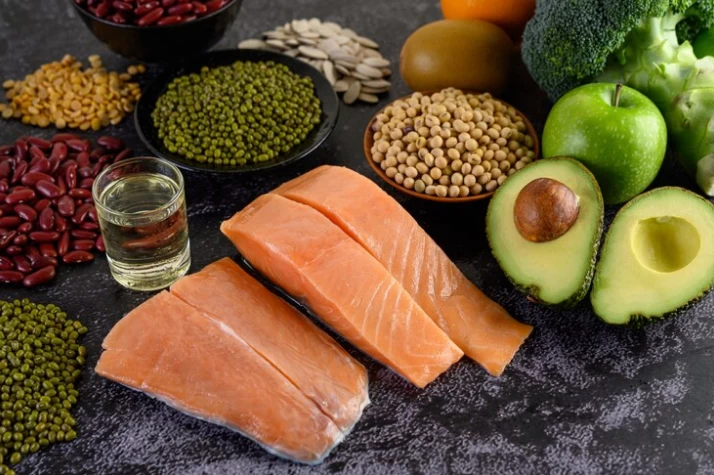
The Importance of Omega-3 and Pure Olive Oil in Child Health
- The Importance of Omega-3 and Pure Olive Oil in Child Health
- What Is Omega-3?
- Omega-3 Fatty Acids: Their Impact on Child Health
- Omega-3 and Attention Deficit Hyperactivity Disorder (ADHD):
- The Impact of Pure Olive Oil on Child Health
- How to Incorporate Omega-3 and Olive Oil into Children's Diets
- In Conclusion
Children require healthy nutrition during their growth and development. During this process, nutrients such as omega-3 fatty acids and pure olive oil play vital roles in child health. Understanding the importance of omega-3 fatty acids and pure olive oil in child health can contribute to ensuring our children lead healthier and happier lives.
What Is Omega-3?
Omega-3 is a type of polyunsaturated fatty acid that is essential for normal bodily functions and offers various health benefits. Omega-3 fatty acids need to be obtained through dietary sources as the body cannot produce these fats on its own. The three most common types of omega-3 fatty acids are as follows:
- Alpha-Linolenic Acid (ALA): This is a plant-based omega-3 fatty acid found in high amounts, especially in flaxseeds, chia seeds, and walnuts. ALA can be converted into the other two main omega-3 fatty acids in the body, but the conversion rate is low.
- Eicosapentaenoic Acid (EPA): EPA is abundant in marine products, particularly in fatty fish like salmon, tuna, and mackerel. EPA plays a role in combating inflammation and supporting cardiovascular health.
- Docosahexaenoic Acid (DHA): DHA is also found in marine products and is crucial for brain development and eye health, especially in children and infants, as it is one of the essential fatty acids required for brain development.
Omega-3 fatty acids are known for their anti-inflammatory properties and their ability to support heart health, brain functions, mental health, and immune system health. Therefore, incorporating foods rich in omega-3 into a balanced diet is essential not only for children but for individuals of all ages.
Omega-3 Fatty Acids: Their Impact on Child Health
Omega-3 fatty acids play a critical role in the mental and physical development of children. The most common omega-3 fatty acids are EPA (eicosapentaenoic acid) and DHA (docosahexaenoic acid). These fatty acids support children's brain development, preserve the structure of nerve cells, and enhance brain functions. They are also crucial for children's immune system health.
Omega-3 fatty acids are particularly found in foods like salmon, tuna, walnuts, and chia seeds. Incorporating these foods into a child's diet can increase their intake of omega-3 and support children's mental development.
Omega-3 and Attention Deficit Hyperactivity Disorder (ADHD):
Some studies suggest that omega-3 fatty acids can assist in the management of behavioral issues like Attention Deficit Hyperactivity Disorder (ADHD). ADHD is characterized by symptoms of inattention, hyperactivity, and impulsivity. Omega-3 supplements can alleviate these symptoms and positively affect a child's academic performance and social relationships.

The Impact of Pure Olive Oil on Child Health
Pure olive oil is a fundamental component of the Mediterranean diet and offers numerous benefits for child health. Olive oil is rich in monounsaturated fatty acids and supports heart health in children. Additionally, olive oil contains antioxidants and reduces inflammation.
Olive oil also aids in weight control for children. Overweight or obese children can achieve better results in their healthy weight loss journeys by using pure olive oil. Moreover, olive oil consumption supports bone health in children by enhancing the absorption of vitamin D.
How to Incorporate Omega-3 and Olive Oil into Children's Diets
To add omega-3 fatty acids and olive oil to children's diets, consider the following recommendations:
- Fish Dishes: Increase children's omega-3 intake by offering fatty fish such as salmon, tuna, or sardines at least once a week. However, frying or grilling fish can reduce the quality and quantity of omega-3 obtained.
- Olive Oil-Based Meals: Enhance pure olive oil consumption by preparing salads, vegetables, or pasta dishes with olive oil.
- Omega-3 Supplements: Omega-3 supplements, especially those designed for children, can help them meet their daily omega-3 needs.
- Healthy Snacks: Provide children with snacks containing omega-3-rich foods like walnuts, almonds, or chia seeds to create a balanced diet.
- Combinations of Omega-3 and Olive Oil: A practical and economical method to provide both these beneficial substances to children is by using supplements containing both Omega-3 and pure olive oil.
In Conclusion
Omega-3 fatty acids and pure olive oil are essential components that support the healthy growth and development of children. Regularly adding these nutrients to children's diets can have positive effects on their mental, physical, and emotional health. However, it is essential to consult a pediatrician or specialist before starting any diet, as every child's needs may vary. Omega-3 and olive oil should be seen as valuable components contributing to the health of children and considered a vital part of a balanced diet.

Dr. Serdar Pop
Pediatrician





